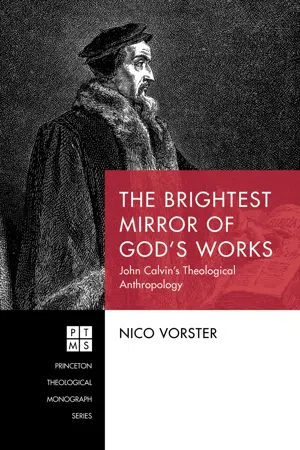![]()
1
The Created Structure of the Human Being
Introduction
Calvin claimed that the human being can only truly be understood in relation to God. The result was an anthropology that decenters the human being. The basic premise of Calvin’s anthropology is that we are not our own, but centered outside ourselves to live in communion with God and our neighbours. We exist in God through the grace of God to heighten the glory of God. This does not mean that Calvin’s anthropology was immune to the popular philosophical notions of the time on the nature of the human being. In fact, he drew strongly on the Aristotelian understanding of the makeup of the human being’s psychological faculties by holding that the human soul consists of an intellect and a will. Calvin made no attempt to devise a unique anthropology in psychological terms; neither did he spend much time on deconstructing the popular notions of the time, except when it compromised his theological agenda. Calvin’s anthropology was driven by theological intentions, and he utilized the psychological terminology of his day to serve his theological argument.
Calvin repeatedly insisted that philosophers and theologians err by not making a distinction between the created structure of the human being, and her condition after the fall. The aim of this chapter is to provide a broad overview of Calvin’s understanding of the created structure of the human being in its original state. Subsequent chapters will provide a deeper reflection on specific issues such as his scepticism of the powers of reason, his understanding of the depravity of the human will and gender. This chapter explicates Calvin’s understanding of the human’s place in creation, the human’s original state, her created relation to Christ, the relation between body and soul, the relationship between the various human faculties, as well as the meaning of the imago Dei. The chapter concludes with a critical evaluation of Calvin’s understanding of the created structure of the human being, while also identifying those insights considered as promising for modern theological-anthropological reflections.
The Created Attributes of the Human Being
Calvin consistently described creation as a “theatre” of God’s glory and the human being as created in order to adore God’s glory in this theatre by living in communion with God. Some passages depict creation as a “mirror” that reflects God’s works and power and compels us to contemplate God, who is in essence invisible. These depictions of creation are in accordance with the central motive of Calvin’s theology: to demonstrate and heighten God’s glory. By contemplating God’s works the human develops a sense of God’s infinite grace that is displayed by the glorious God condescending to us and adorning a creature “so miserable as man.” Creation also teaches us “reverence” and “fear” for God and induces us to “ask every good thing from God,” since humanity is the “workmanship” of God, while God is the “origin and fountain of all goodness.” In fact, creation displays God’s works so gloriously that “none, however dull and illiterate, can plead ignorance as their excuse.”
In Calvin’s thought, both creation and humanity are “mirrors” of God. Whereas creation as a whole shines forth the macrocosmic image of God; the human being, as a created part of nature, constitutes a microcosmic image of God. Yet, within the hierarchy of created “mirrors” in God’s creation, the mirror of the human being reflects God’s glory the “brightest,” because, contrary to all other creatures, the human is inhabited by an immortal spirit. Calvin maintained this view consistently from his earliest works, such as Psychopannychia, through to his later works.
According to Calvin, the human person must be considered, first of all, from the “condition of innocence in which he was created.” In doing so, we acquire an awareness of God’s goodness, while also realizing that we depend fully on God since nothing exists apart from God. Knowledge of the primeval dignity of human beings is theologically important, because it stimulates us to pursue the original end for which we were created. As pinnacle of God’s creation the human being was created good; sin was in no sense part of the “substance” of the human being. Calvin emphasized the accidental nature of sin, because any ...
